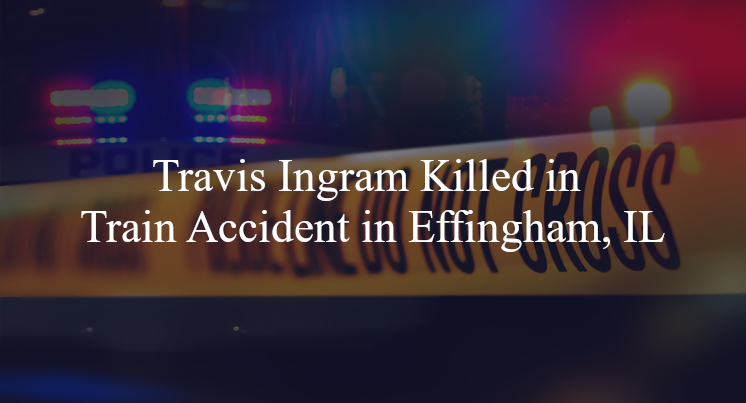Travis Ingram Killed in Train Accident in Effingham, IL
Effingham, IL — May 14, 2025, One person was killed following a train accident that occurred at around 4:45 P.M. on Jefferson Street.

An investigation is underway following a car accident that left one person dead during the afternoon hours of May 14th. According to official reports, Travis Ingram was traveling on a bicycle on Jefferson Street and attempted to cross railroad tracks when he was struck by an oncoming train.
When first responders arrived on the scene, they found that Ingram had sustained serious injuries and they were transported to the hospital for treatment where he was later pronounced deceased. Ingram was also reportedly wearing headphones which may have inhibited his ability to hear the train. At this time there has been no further information released from the accident, however this remains an ongoing investigation and more details may be released by authorities in the future.
Commentary
When a cyclist is fatally struck by a train while crossing railroad tracks, it’s essential that investigators consider all factors that may have contributed to the collision—particularly when early reports suggest the cyclist may have been wearing headphones. The May 14th incident on Jefferson Street underscores the dangers at rail crossings, especially for non-motorized road users. To fully understand what occurred and whether it could have been prevented, three critical questions must guide the investigation.
First, was the crossing environment properly evaluated to determine visibility, signaling, and the cyclist’s ability to perceive the train’s approach? Investigators should assess whether there were functioning warning signals or gates at the crossing, whether signage was clearly visible, and whether the angle of the crossing may have limited the cyclist’s view of oncoming trains. It’s also important to determine whether the train used its horn and how much advance warning it gave. A full scene analysis is key to identifying whether environmental factors reduced the cyclist’s ability to detect the train.
Second, has any role played by a possible equipment or infrastructure issue been considered? Investigators should evaluate the condition of the crossing itself—including surface smoothness and rail angles—as rough or poorly maintained tracks can cause cyclists to slow or look down, potentially distracting from oncoming hazards. In addition, any reports of malfunctioning crossing gates, signal lights, or obstructions should be documented and reviewed as part of the investigation.
Third, has all relevant electronic and physical data been reviewed? Most trains are equipped with event recorders that capture speed, horn usage, and braking activity. Reviewing this data can confirm whether the train operator took appropriate steps to avoid the collision. If any surveillance footage or nearby cameras are available, they may also provide additional insight into the cyclist’s behavior and the sequence of events leading up to the impact. While the reported use of headphones may have limited the cyclist’s awareness, investigators should rely on physical and digital evidence to confirm or refute that detail.
Crashes involving trains and cyclists are typically high-consequence events with very limited reaction time for both parties. These three investigative questions—focused on crossing conditions, infrastructure reliability, and electronic records—are essential for building a complete, fact-based understanding of what happened. That clarity is vital not only for accountability but also for improving safety practices and infrastructure at similar crossings in the future.

*We appreciate your feedback and welcome anyone to comment on our blog entries, however all visitor blog comments must be approved by the site moderator prior to showing live on the site. By submitting a blog comment you acknowledge that your post may appear live on the site for any visitors to see, pending moderator approval. The operators of this site are not responsible for the accuracy or content of the comments made by site visitors. By submitting a comment, blog post, or email to this site you acknowledge that you may receive a response with regard to your questions or concerns. If you contact Grossman Law Offices using this online form, your message will not create an attorney-client relationship and will not necessarily be treated as privileged or confidential! You should not send sensitive or confidential information via the Internet. Since the Internet is not necessarily a secure environment, it is not possible to ensure that your message sent via the Internet might be kept secure and confidential. When you fill out a contact or comment form, send us an email directly, initiate a chat session or call us, you acknowledge we may use your contact information to communicate with you in the future for marketing purposes, but such marketing will always be done in an ethical way.